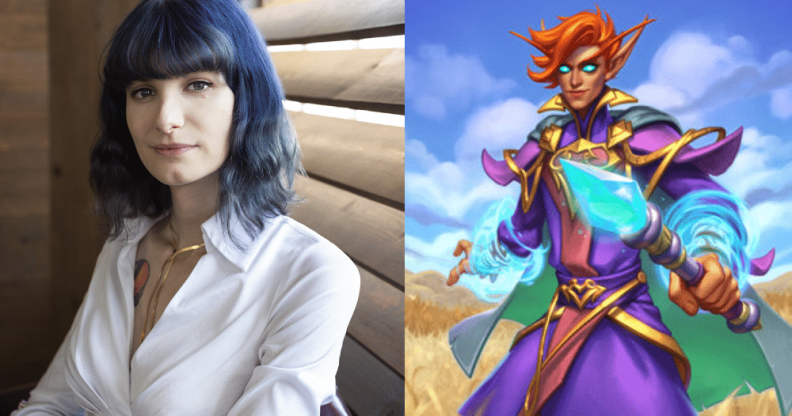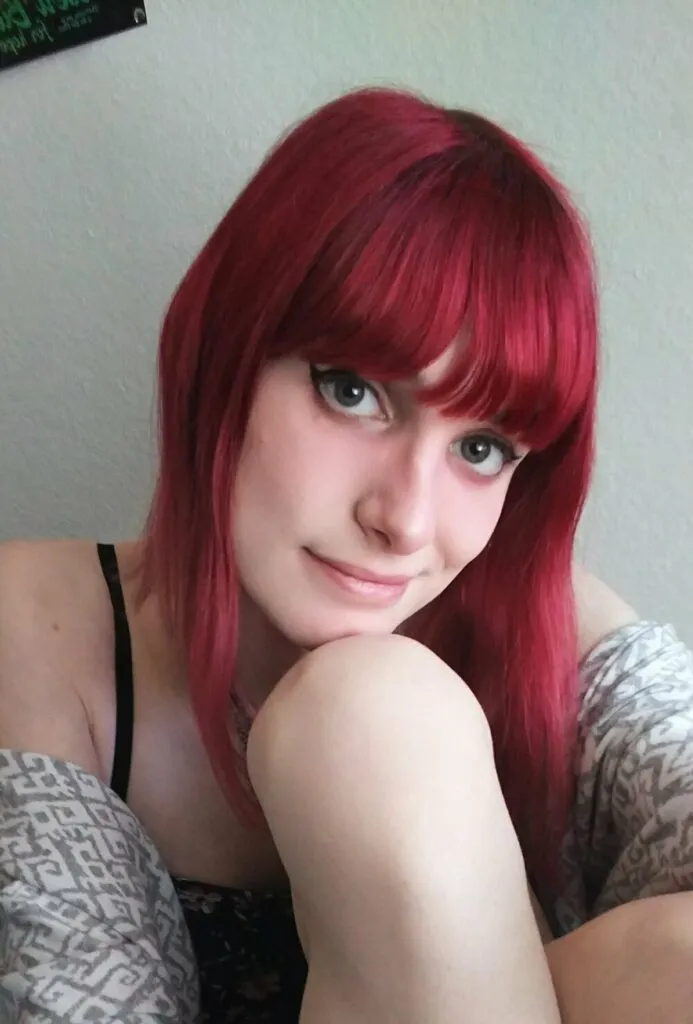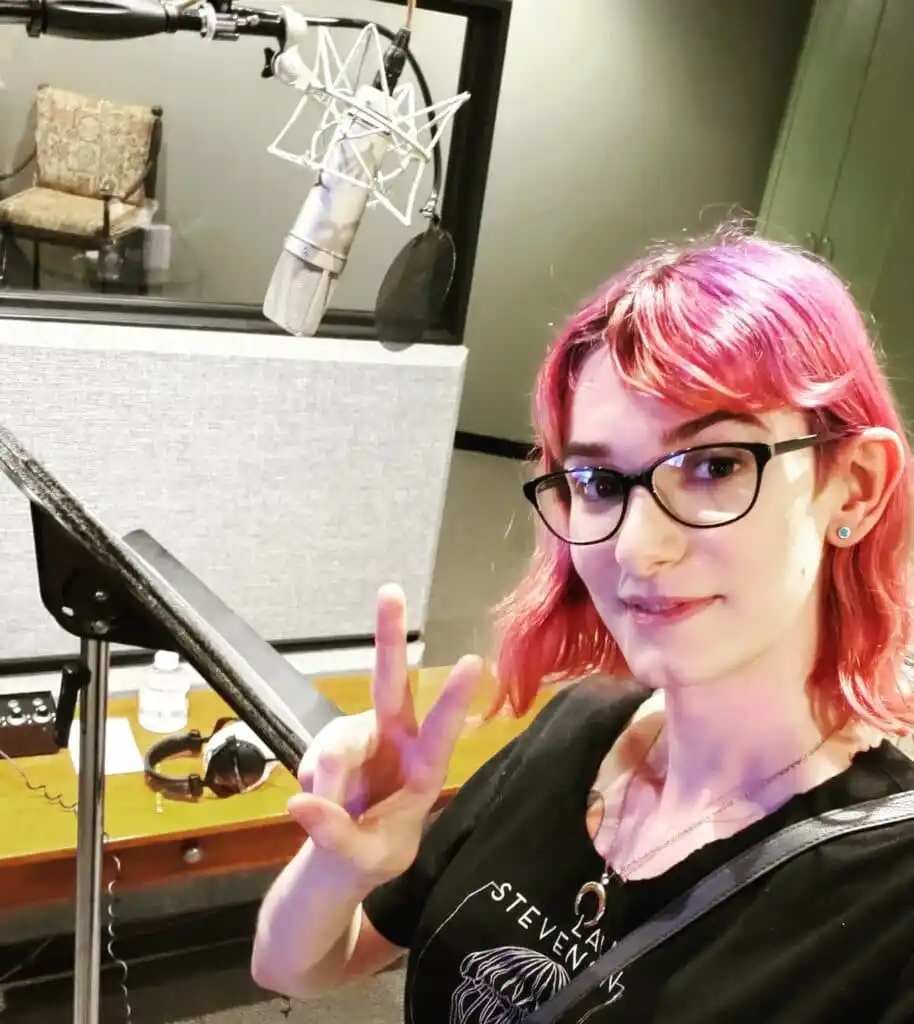Trans actor explains why voicing Hearthstone’s first non-binary character was so important to her

Kayleigh McKee and Varden Dawngrasp. (Blizzard)
Voice artist Kayleigh McKee has an incredible range. With seemingly effortless ease she flits between typically masculine and feminine ranges.
Even the robotic Zoom “recording in progress” line is perfectly imitated.
“I will say, anybody can get this range,” she says modestly. “This is all stuff that I just had to do over time and learn. But because I’ve put in that time, I reaped the dividends.”
McKee’s career includes voiceover work for roles of all genders in both gaming and anime, including games like Genshin Impact and the just-released NEO: The World Ends With You.
She’s also the voice of Varden Dawngrasp, Hearthstone’s first non-binary character. Pokémon may have been her entry point into gaming, but as a fan of World of Warcraft growing up, voicing Varden was “one of the coolest things and one of the best first forays into AAA gaming that I could have asked for”.
As a trans voice artist, McKee describes herself as “an entire woman, and then some” with regards to her range and ability to play roles of all genders. Yet she remained apprehensive at first about pioneering the role.
“Could I bring this to life, not only as a trans umbrella character, but as a non-binary character? And they trusted me on it,” she says. “I just kind of went for it. And I just leaned into what I saw as the core of their being using my own experiences.”
The responses to her playing Varden have been positive, proving that she’s more than capable.
“Everything in my career now is just sugar on top. When you get one person to say ‘thank you, your performances have helped me feel like I don’t have to stay in the closet’ I’m like, boom, that’s what I got into this for. Now I just get to ride this wave and continue to try and be a good role model, a good representation of my community.”
McKee has her Dungeons & Dragons loving dad to thank for her introduction to cartoons and video games. Later she got involved in theatre, but it was Laura Jane Grace – trans lead singer of the punk band Against Me – who really inspired her. When Grace came out “she said that she was going to continue using her voice for representation. And I knew that I wanted to do acting, I knew that I wanted to be involved in games and cartoons. After I heard that, I knew that’s what I needed to do.”
Voice acting has certainly opened doors for trans actors like McKee. “If I were on stage, I would not want to portray a man,” she says. “But behind the microphone I can use the range that I’ve always had to go [lifts voice] up here, do something a little light and cheery, and then come way down here [drops voice] and do folks that have voices like this comfortably.
“It allows me to do roles that I never could have dreamed of doing, and such a range of roles. That just makes me so happy.”
Most of the time it’s her skill and voice alone that gets her a role. Yet on the flip side, there are casting directors – even so-called allies – who are concerned about offending, or saying the wrong thing, or worry that fans won’t appreciate a woman playing a man.
“I definitely lose roles to that as well,” she says. “But to make up for it, it gives me this wide berth of possible characters to the people who are willing to say she has the skill, she has the ability.”

Kayleigh McKee.
The challenges faced by trans voice artists
There are many more challenges faced by trans voice artists. One of those is even seeing roles in the first place.
Online audition sites, for instance, will often split roles between men and women with no way to look across both, as opposed to being able to filter by vocal range. A human touch is certainly welcome – McKee is particularly thankful for how open her agent has been – but not all agencies are understanding.
Even working with indie creators: “half of them are very, very proactive and socially advanced. And then the other half is like, I’ve never done this before, and you make me uncomfortable,” she says.
Does the versatility of her range open doors to opportunities, or is she often typecast in queer roles?
“People will hear me do a feminine role, and they’ll see my face. And then they’ll only ever send me feminine auditions. Because that’s what they’ve known me for,” says McKee.
She’s keen for the doors to be opened across the gender spectrum, that all opportunities are shared out allowing voice artists to choose for themselves which roles their voice may be suitable for.
And while being a diversity hire is a rarity for McKee, there are still occurrences of being offered unsuitable roles through lack of education. “Understanding comes slowly,” she says, “but I think it will come.”
There are further challenges around being ‘too trans’ or ‘not trans enough’. McKee describes one incident where she was auditioning for a trans girl and was asked to speak higher, even though this was physically demanding. Eventually, the casting director went with a non-trans voice artist.
Non-binary folk in particular face this issue. For those assigned male at birth, they’re often thought of as men and not given roles that are femme presenting – something voice artist Casey Mongillo has discussed. For those assigned female at birth, they’re treated as “girl light” where a character is non-binary but directors want them to sound like a girl.
“[Directors] should have the thought of inclusion and ability and what people are able to do and what people are truly right for these kinds of things,” says McKee. “Particularly, be open to queer sounding characters.”
She adds: “You don’t sound trans enough, or you sound too trans. It’s such a constant battle.”

Kayleigh McKee.
For some trans voice artists, the whole notion of vocal ranges and gendered roles may be a source of dysphoria. McKee, though, plays to her strengths. “Personally, for me, playing those characters, I know that it does not make me any less of a woman, it does not make me any less of me,” she says.
She notes, too, that women have played male roles in cartoons for decades. And if a woman has the ability to do it, why not?
So what can be done to support trans folk in the voice acting industry?
“What I want is, if you are cis and you have something that is telling our stories, include us in the casting process and also include us in dialogue sensitivity,” says McKee.
“If you are in the audience, if you are a consumer of these games or these shows, or if you’re a writer, just accept us based on our skill as a performer. Treat us as humans.
“Help us be seen, help us get those roles, because we have been shut out for so long. Eventually, I hope that there is a world where anybody can audition for anything of any gender, because there will be no more inequality, no more need to bring other folks up to level. But right now, that is not the case.”
Of course, there are those in the industry who are showing the necessary support. “I wanted to give a big thanks to the industry for the people who have accepted me and accepted my friends and have been learning and growing,” says McKee.
Above all, McKee just wants trans voice artists to be treated equally.
“I’m just a gal behind the microphone, doing what everybody else is doing. And I want folks to recognise that.”
For more gaming news, follow Gaymeo on Facebook and Twitter. You can also email us with any news or tips on [email protected]

